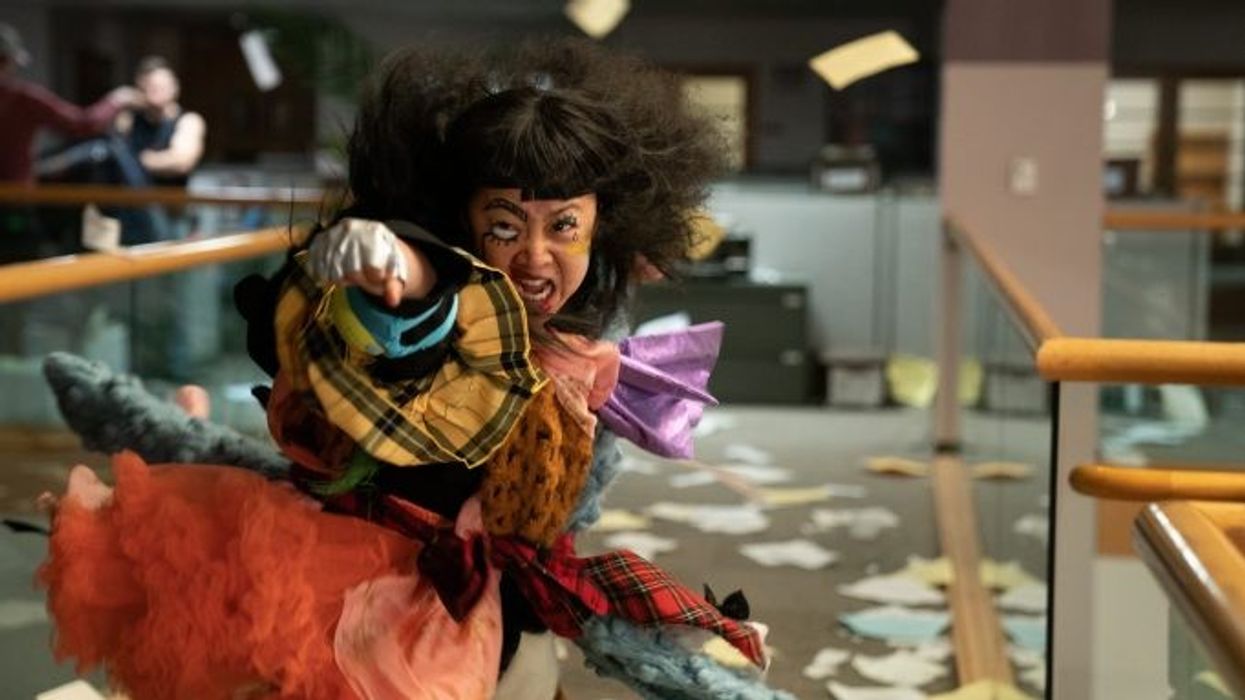Edgar Wright Chats with Daniels about Today's Film Villains and Imposter Syndrome
Even the best of us get imposter syndrome once in a while.

It's already been a great year for movies, withEverything Everywhere All at Once becoming a breakout hit that keeps making fans all over the globe. One of the movie's biggest fans is Edgar Wright, a brilliant director in his own right, who had an extremely fun film, Last Night in Soho, come out last year.
Recently, Wright sat down for Sight & Sound with Daniels, the directors of Everything Everywhere All at Once to talk about the movie, their lives, and what drives them.

Daniel Kwan and Daniel Scheinert, collectively Daniels, are some of the most fun filmmakers working. Their pursuit of practical effects, weird ideas, and embracing of trope reversals makes their movies something incredibly special. Hearing them talking to Wright was so fun.
The conversation went all over the place. It began talking about superheroes, and how in most of those movies, they end with fights in the sky and a lot of CGI. But in their movie, it was a much more personal battle.

Daniel Kwan said:
"I saw a tweet recently that made me laugh, where the person wrote: '[In] the Disney stories of my childhood, the villains were all evil witches. [In] the Disney stories of now, the villains are my disappointing parents.' I think that marks a shift in our cultural myth of what we consider to be evil. Evil witches are this ‘other’ mystical thing that we can never fully understand. Disappointing parents causing us generational trauma—that then trickles into the rest of our lives—is a more honest and nuanced way to look at evil. Very early on we knew there was not going to be a villain in this movie. The villain is existence itself. The cold, indifferent universe…"
But it takes a lot of work to get to a place where you can even make a movie like this one and contemplate those stakes. Wright asked them about the feeling of imposter syndrome and dealing with it.
Daniel Scheinert had this to say:
"We had a different solution. We have very similar tastes, but we came from very different backgrounds. Kwan retreated into animation in college and I retreated into my comedy troupe. I became the video guy and we would put on improv shows and stuff. Doing improv comedy is like you’re just practicing how to be an impostor. You have no clue what you’re going to say or do or if it’s going to be good. You have to walk out and be, 'Welcome to the show, so glad you came!' Early on, we joked sometimes that I was the entitled white arrogant director, who was like: 'Yes, you hired us and we deserve to be here!' and he was the neurotic one with impostor syndrome…"
One of the most interesting parts of the movie for me was how it dealt with technology. There was a real generational divide when it came to how people dealt with certain things. Like the IRS and paper receipts, parents and phones, and kids texting back and forth.
Daniel Scheinert said:
"Yesterday, I realized that we never say anything about the internet. We don’t really point at anyone’s phone. No one is looking at social media. But the movie is totally a reaction to that. Jobu/Joy is like a character that grew up on the internet who is struggling to be understood by her mom, who did not grow up on the internet. I don’t want to tell you about the chat rooms I went into when I was 10, but it was weird. It’s changed just how overstimulated and distracted we are."

One of the most touching parts of the interview is when the directors talk about ADHD and how it affects them as directors. Whether it's working at weird times, scripting everything out so they stay on track, or just finding little ways to stay connected, they figure it out.
Daniel Kwan said:
"I will say is: I’m diagnosed. I’m still the same human being, I’m still just as creative. Some days I’m really struggling, and I take some Adderall and that’s fine, and I can just normalize myself. But on most days, I can just be myself and I’m lucky enough to have a career where I’m allowed to just fuck up every day and that’s fine. Whereas before, in high school, every day was misery because I was fucking up all the time and the system didn’t leave room for that. We’re very lucky in that we set our own schedules and be our own bosses or whatever for the most part. But I just say to you and any reader that if you’re curious, try to look into it."
It was amazing reading these three directors go over their process, as well as what makes directors tick.
Check out the entire interview on BFI and let us know what you think in the comments.

 "'Back Home"via Mercedes Arutro
"'Back Home"via Mercedes Arutro 'Back Home'via Mercedes Arutro
'Back Home'via Mercedes Arutro 









